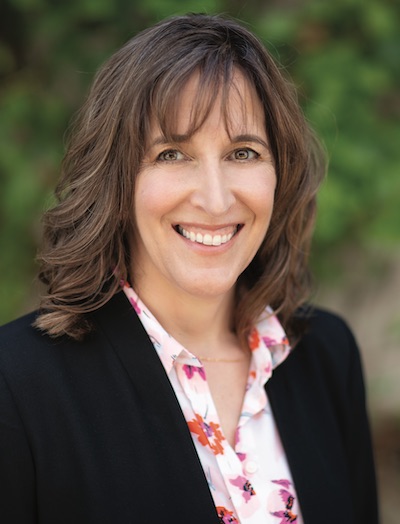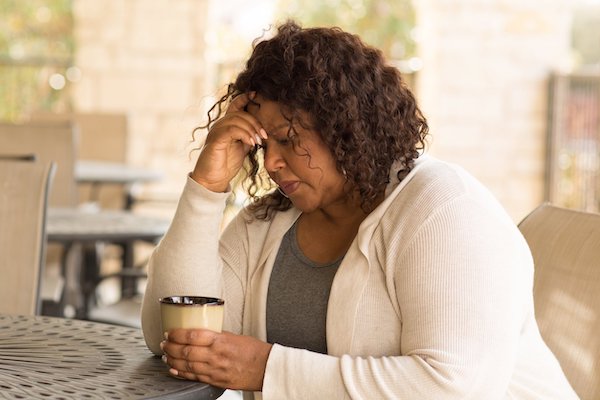Getting a Handle on Your Anxiety while Coping with Cancer
by Nicole Barr RN, FNP-C, LMFT
Do you ever feel restless? On edge? Uneasy? Consumed with worried thoughts? Maybe even a little panicky? These are all signs of anxiety.
Anxiety is a distressing emotional state that arises when we are faced with stressful, potentially dangerous, or unfamiliar situations. When we feel anxious, we often experience rapid-fire worried thoughts combined with feelings of unease. This can cause you to have trouble sleeping or make it difficult for you to cope with everyday stressors, not to mention the stress of cancer.
Some anxiety is common – even normal – after a cancer diagnosis. In fact, when I ask cancer survivors if they’re experiencing any signs of anxiety, many of them answer, “Yes, who wouldn’t be?” After all, being diagnosed with cancer and undergoing cancer treatment can definitely be considered a stressful, potentially dangerous, and unfamiliar situation for most people.
However, just because something is common, that doesn’t mean you have to merely live with it. Uncontrolled anxiety can have a negative impact on your health and your quality of life. Here are some tips to help you get a handle on your anxiety while coping with cancer.
❊ Schedule your worry. It’s nearly impossible to eliminate worry altogether. Besides, a small amount of anxiety can be protective, like a sentry at the gate alerting us to danger. You don’t want to fire this “worry warrior,” but you can teach him to be more efficient.
Put your worry on a schedule. Set aside some time each day for you to worry – either one large block or several smaller chunks spread throughout the day, whatever works for you. During this time, think about all your worries. You can scan your body for troublesome symptoms and log them for your healthcare provider. Write down any questions or concerns that pop up. Make a list of problems you need to resolve or tasks to tackle later. Then, at the end of the worry period, stop and do something else.
Some people think feeling fear or anxiety means you are weak or there is something wrong with you. This is not true! Resilient, resourceful, strong people experience fear and anxiety.
When worry comes to mind outside of your scheduled worry time, pause and check to see if this worry represents an
immediate threat. If not, simply thank that vigilant sentry for looking out for you and resolve to revisit these concerns during your next worry period.
❊ Set limits on web-surfing. Take notice of how you feel after a long consultation with “Dr. Google,” or after scrolling online peer forums. If you find you feel more anxious, cut back. Set limits on how much time you allow yourself to surf the web. Starting a timer whenever you go online can help you stick to your limit. Once your timer goes off, deliberately move on to a rewarding offline activity.
❊ Remember that this too shall pass. Certain points along the cancer journey are uniquely stressful, but you will get through them. Think back to when you first heard the word cancer or chemo.This probably brought on some feelings of fear or anxiety. Not yet having a plan to attack your cancer can feel like torment. But this phase is temporary. Once you have a treatment plan in place – and particularly once treatment begins – these initial fears will begin to subside.
Another phase that often brings up anxiety is the end of active treatment. For months, your life has been dictated by medical appointments and your mind has been laser-focused on beating cancer. Once that all ends, you may feel unmoored, unsure of the next steps. But, with the right support and by giving yourself time and space for mental and physical healing, you will find your new normal. This phase, too, shall pass.
Each phase has a start and an end. Yes, anxiety will continue to pop up from time to time, especially when you have an upcoming scan or follow-up appointment. However, your anxiety will not be at high volume always; you will naturally feel calmer when it has passed through you. It’s a good idea to have some tools you can use to help you cope during those times when anxiety is likely to spike.
❊ Practice self-compassion. Be kind to yourself, even when you’re feeling anxious – especially when you’re feeling anxious. Some people think feeling fear or anxiety means you are weak or there is something wrong with you. This is not true! Resilient, resourceful, strong people experience fear and anxiety. Remind yourself: Emotions come and go. This is normal. This is scary. It’s OK to be afraid. Labeling fear or anxiety as just what it is and not judging yourself for having those feelings goes a long way toward restoring calm to your body and mind.
❊ Uncover your underlying fears. Avoidance feeds anxiety. That’s why many forms of anxiety treatment involve facing your fears, with support. Acknowledging your fears is the first step toward deeper peace of mind. If you are able, write down what it is you are really afraid of. Go ahead and dig deep. Next, find someone you can talk with about your fears. This can be your doctor, a counselor or therapist, or a trusted friend. Just make sure you pick someone who isn’t going to just pat you on the head and say, “There, there. It’s all going to be OK.” The goal is to name your fears because the simple act of acknowledging them can loosen the grip they have on you.
❊ Focus on what you can control. Feeling a lack of control increases stress. And if there’s one thing cancer does well, it’s show you just how much is out of your control. However, there are things in your life you can control. Focus your energy on those things. Exercise, eat a healthy diet, go to bed at a suitable time. Set achievable goals and work toward them. Make plans with friends. So many things are out of your hands during cancer treatment; therefore, focusing on those things you do have some control over will give you a feeling of purpose and bring about a sense of calm.
❊ Remember your strengths. In times of anxiety, it helps to remember the perseverance and purpose that has brought you this far. Evoking your strengths can boost your confidence when you find yourself feeling helpless. Your strengths might include perseverance, faith, flexibility, self-discipline, an optimistic outlook, or maybe a dark sense of humor that helps you laugh through the hardest times. Write down your strengths on a piece of paper and pull out your list any time you need a reminder.
❊ Be open to medication. People are often fearful about adding more medication during cancer treatment. However, if your anxiety is persistent, interfering with your daily life, and supportive strategies are not enough, you may need to try medication. Your doctor can help you decide if anxiety medication is right for you.
❊ Breathe. Finally, learn to calm your body through grounding techniques, breathing exercises, or meditation. Ask your doctor, therapist, or hospital social worker for techniques you can try. Find a few that you like and that work for you. The key is to practice them daily when you are in a calmer state of mind so you can more readily access them when fear and worry are higher. These strategies can also help you keep anxiety at bay while you’re waiting for procedures, or getting chemo or radiation.
Letting Go of Anxiety and Fear
People can sometimes be ambivalent about reducing anxiety because it feels protective. You may be hesitant to “let down your guard” in an already scary situation. However, uncontrolled anxiety fills your body with the chemicals of fear: adrenaline and cortisol. This can make it hard for you to make necessary decisions, it can interfere with your sleep, and can sap the joy out of spending time with your family and friends.
A small amount of worry or stress is normal (and even sometimes helpful), as long as it’s proportionate to the situation. However, too much exacts a toll. Instead of letting your worry rule the day, try these strategies to reduce your anxiety and bring more calm, purpose, and peace of mind to your life during cancer treatment and beyond.

Nicole Barr is a nurse practitioner and psychotherapist in the Psychosocial Oncology Clinic at the Stanford Cancer Center in Palo Alto, CA. She also has a private practice.
This article was published in Coping® with Cancer magazine, September/October 2022.


